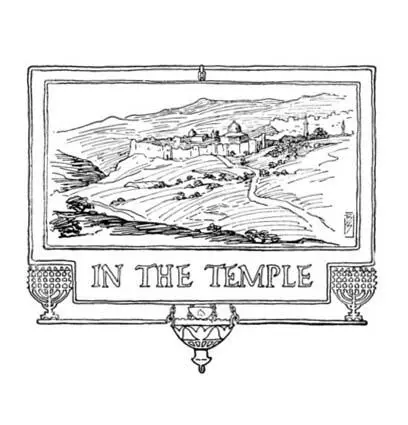He was annoyed with his birds, who stood so calmly and let themselves be trampled upon without paying the slightest attention to the danger. Jesus clapped his hands to awaken them; then he shouted: “Fly, fly!”
Then the three birds began to move their tiny wings, and, fluttering anxiously, they succeeded in swinging themselves up to the eaves of the house, where they were safe.
But when Judas saw that the birds took to their wings and flew at Jesus’ command, he began to weep. He tore his hair, as he had seen his elders do when they were in great trouble, and he threw himself at Jesus’ feet.
Judas lay there and rolled in the dust before Jesus like a dog, and kissed his feet and begged that he would raise his foot and crush him, as he had done with the clay cuckoos. For Judas loved Jesus and admired and worshiped him, and at the same time hated him.
Mary, who sat all the while and watched the children’s play, came up and lifted Judas in her arms and seated him on her lap, and caressed him.
“You poor child!” she said to him, “you do not know that you have attempted something which no mortal can accomplish. Don’t engage in anything of this kind again, if you do not wish to become the unhappiest of mortals! What would happen to any one of us who undertook to compete with one who paints with sunbeams and blows the breath of life into dead clay?”

Table of Contents
Once there was a poor family—a man, his wife, and their little son—who walked about in the big Temple at Jerusalem. The son was such a pretty child! He had hair which fell in long, even curls, and eyes that shone like stars.
The son had not been in the Temple since he was big enough to comprehend what he saw; and now his parents showed him all its glories. There were long rows of pillars and gilded altars; there were holy men who sat and instructed their pupils; there was the high priest with his breastplate of precious stones. There were the curtains from Babylon, interwoven with gold roses; there were the great copper gates, which were so heavy that it was hard work for thirty men to swing them back and forth on their hinges.
But the little boy, who was only twelve years old, did not care very much about seeing all this. His mother told him that that which she showed him was the most marvelous in all the world. She told him that it would probably be a long time before he should see anything like it again. In the poor town of Nazareth, where they lived, there was nothing to be seen but gray streets.
Her exhortations did not help matters much. The little boy looked as though he would willingly have run away from the magnificent Temple, if instead he could have got out and played on the narrow street in Nazareth.
But it was singular that the more indifferent the boy appeared, the more pleased and happy were the parents. They nodded to each other over his head, and were thoroughly satisfied.
At last, the little one looked so tired and bored that the mother felt sorry for him. “Now we have walked too far with you,” said she. “Come, you shall rest a while.”
She sat down beside a pillar and told him to lie down on the ground and rest his head on her knee. He did so, and fell asleep instantly.
He had barely closed his eyes when the wife said to the husband: “I have never feared anything so much as the moment when he should come here to Jerusalem’s Temple. I believed that when he saw this house of God, he would wish to stay here forever.”
“I, too, have been afraid of this journey,” said the man. “At the time of his birth, many signs and wonders appeared which betokened that he would become a great ruler. But what could royal honors bring him except worries and dangers? I have always said that it would be best, both for him and for us, if he never became anything but a carpenter in Nazareth.”
“Since his fifth year,” said the mother reflectively, “no miracles have happened around him. And he does not recall any of the wonders which occurred during his early childhood. Now he is exactly like a child among other children. God’s will be done above all else! But I have almost begun to hope that our Lord in His mercy will choose another for the great destinies, and let me keep my son with me.”
“For my part,” said the man, “I am certain that if he learns nothing of the signs and wonders which occurred during his first years, then all will go well.”
“I never speak with him about any of these marvels,” said the wife. “But I fear all the while that, without my having aught to do with it, something will happen which will make him understand who he is. I feared most of all to bring him to this Temple.”
“You may be glad that the danger is over now,” said the man. “We shall soon have him back home in Nazareth.”
“I have feared the wise men in the Temple,” said the woman. “I have dreaded the soothsayers who sit here on their rugs. I believed that when he should come to their notice, they would stand up and bow before the child, and greet him as Judea’s King. It is singular that they do not notice his beauty. Such a child has never before come under their eyes.” She sat in silence a moment and regarded the child. “I can hardly understand it,” said she. “I believed that when he should see these judges, who sit in the house of the Holy One and settle the people’s disputes, and these teachers who talk with their pupils, and these priests who serve the Lord, he would wake up and say: ‘It is here, among these judges, these teachers, these priests, that I am born to live.’”
“What happiness would there be for him to sit shut in between these pillar-aisles?” interposed the man. “It is better for him to roam on the hills and mountains round about Nazareth.”
The mother sighed a little. “He is so happy at home with us!” said she. “How contented he seems when he can follow the shepherds on their lonely wanderings, or when he can go out in the fields and see the husbandmen labor. I can not believe that we are treating him wrongly, when we seek to keep him for ourselves.”
“We only spare him the greatest suffering,” said the man.
They continued talking together in this strain until the child awoke from his slumber.
“Well,” said the mother, “have you had a good rest? Stand up now, for it is drawing on toward evening, and we must return to the camp.”
They were in the most remote part of the building and so began the walk towards the entrance.
They had to go through an old arch which had been there ever since the time when the first Temple was erected on this spot; and near the arch, propped against a wall, stood an old copper trumpet, enormous in length and weight, almost like a pillar to raise to the mouth and play upon. It stood there dented and battered, full of dust and spiders’ webs, inside and outside, and covered with an almost invisible tracing of ancient letters. Probably a thousand years had gone by since any one had tried to coax a tone out of it.
But when the little boy saw the huge trumpet, he stopped—astonished! “What is that?” he asked.
“That is the great trumpet called the Voice of the Prince of this World,” replied the mother. “With this, Moses called together the Children of Israel, when they were scattered over the wilderness. Since his time no one has been able to coax a single tone from it. But he who can do this, shall gather all the peoples of earth under his dominion.”
She smiled at this, which she believed to be an old myth; but the little boy remained standing beside the big trumpet until she called him. This trumpet was the first thing he had seen in the Temple that he liked.
Читать дальше













